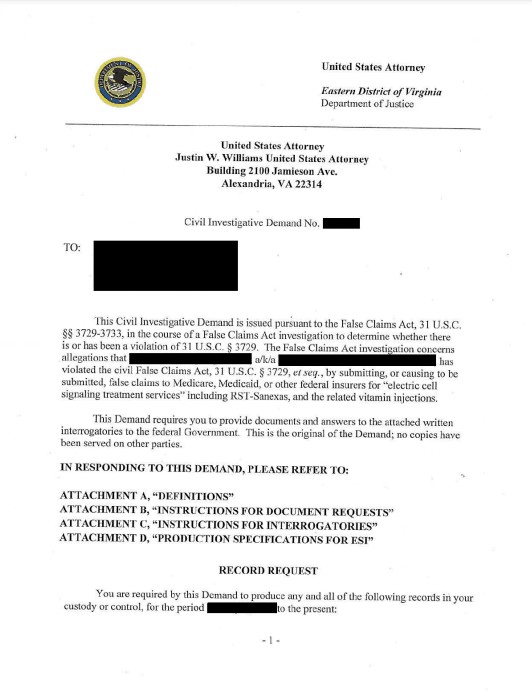Are you curious about legal procedures and the government’s information-gathering powers? At WHAT.EDU.VN, we break down complex topics for everyone. What is a Civil Investigative Demand, or CID? It’s a formal request from a government agency for information related to an investigation. Learn about its implications and how it can affect individuals and businesses. Explore governmental inquiries, legal proceedings, and administrative subpoenas.
1. Understanding the Basics of a Civil Investigative Demand (CID)
A Civil Investigative Demand (CID) is a powerful tool used by government agencies to gather information during investigations. It’s essentially an administrative subpoena that allows agencies to request extensive documentation and information from individuals or organizations without needing prior court approval. Think of it as a formal inquiry, often a precursor to potential legal action, where the government seeks to understand whether laws have been violated.
2. Who Issues Civil Investigative Demands?
Several federal and state agencies have the authority to issue CIDs. Some of the most common include:
- The Department of Justice (DOJ): This agency uses CIDs to investigate a wide range of potential violations, including antitrust issues, healthcare fraud, and other civil matters.
- The Federal Trade Commission (FTC): The FTC primarily uses CIDs in antitrust investigations and cases involving deceptive business practices.
- The Consumer Financial Protection Bureau (CFPB): The CFPB issues CIDs to investigate companies suspected of unfair, deceptive, or abusive practices in the financial sector.
It’s important to note that state Attorneys General can also issue CIDs in connection with investigations into Medicaid fraud and other civil matters at the state level.
3. What is the Purpose of a CID?
The primary purpose of a CID is to allow government agencies to gather the necessary information to determine whether a potential violation of the law has occurred. This can include examining documents, obtaining written answers to interrogatories, and taking oral testimony. The CID process allows agencies to efficiently collect evidence before deciding whether to pursue formal legal action.
4. What Types of Information Can a CID Request?
A CID can request a broad range of information, including:
- Documents: This can include paper documents, electronic files, emails, and other forms of recorded information.
- Interrogatories: These are written questions that the recipient of the CID must answer under oath.
- Testimony: The CID can require individuals to provide oral testimony under oath, either in person or remotely.
5. What Should You Do if You Receive a CID?
Receiving a CID can be a stressful experience. It’s important to take the following steps:
- Consult with an Attorney: The first and most important step is to consult with an experienced attorney who understands CID law and can advise you on your rights and obligations.
- Understand the Scope of the CID: Carefully review the CID to understand the information being requested and the deadlines for responding.
- Preserve Documents: Immediately take steps to preserve all documents and information that may be responsive to the CID. This includes implementing a “legal hold” to prevent the destruction or alteration of relevant materials.
- Prepare a Response: Work with your attorney to prepare a complete and accurate response to the CID. This may involve gathering documents, answering interrogatories, or preparing for testimony.
6. Can You Challenge a CID?
While challenging a CID is possible, it can be difficult. Courts typically give deference to the government’s authority to investigate potential violations of the law. However, there are some grounds for challenging a CID, including:
- Undue Burden: If the CID is overly broad or requires the recipient to produce an excessive amount of information, it may be challenged on the grounds of undue burden.
- Irrelevance: If the information requested is not relevant to the investigation, it may be challenged as irrelevant.
- Privilege: If the information requested is protected by attorney-client privilege or another legal privilege, it may be withheld.
7. What Happens if You Don’t Comply with a CID?
Failure to comply with a CID can have serious consequences, including:
- Contempt of Court: If you fail to comply with a CID, the government can seek a court order compelling you to comply. Failure to comply with a court order can result in being held in contempt of court, which can lead to fines or even imprisonment.
- Financial Penalties: In some cases, failure to comply with a CID can result in financial penalties.
- Criminal Charges: In rare cases, intentionally obstructing a government investigation can lead to criminal charges.
8. Key Differences Between a CID and a Regular Subpoena
While both CIDs and regular subpoenas are legal instruments used to compel the production of information, there are key differences between them:
- Court Approval: CIDs are issued administratively by government agencies without prior court approval, while regular subpoenas typically require court approval.
- Scope: CIDs can often be broader in scope than regular subpoenas, allowing agencies to request a wider range of information.
- Stage of Investigation: CIDs are often issued early in an investigation, before any formal legal action has been taken, while regular subpoenas are typically issued during litigation or other formal legal proceedings.
9. The Role of Legal Counsel in Responding to a CID
Having experienced legal counsel is crucial when responding to a CID. An attorney can:
- Advise you on your rights and obligations.
- Help you understand the scope of the CID.
- Assist you in gathering and preparing responsive documents and information.
- Negotiate with the government on your behalf.
- Challenge the CID if appropriate.
- Represent you in court if necessary.
10. What are the Potential Consequences of a Federal Investigation?
Facing a federal investigation can have significant consequences for individuals and businesses. Here are some potential outcomes:
- Financial Penalties: A finding of civil liability can lead to substantial financial penalties.
- Reputational Damage: A government investigation can damage your reputation, even if you are not ultimately found liable.
- Criminal Charges: In some cases, a civil investigation can lead to criminal charges if evidence of intent is discovered.
11. How to Select a CID Defense Law Firm
Choosing the right law firm to represent you in a CID matter is essential. Consider the following factors:
- Experience: Look for a firm with extensive experience in handling CID investigations.
- Expertise: Make sure the firm has attorneys who are knowledgeable about the specific laws and regulations involved in your case.
- Reputation: Check the firm’s reputation and track record.
- Resources: Ensure the firm has the resources necessary to handle your case effectively.
- Communication: Choose a firm that communicates clearly and keeps you informed throughout the process.
12. We Handle All State and Federal Civil Investigative Demands
At WHAT.EDU.VN, we understand that navigating the complexities of a Civil Investigative Demand (CID) can be overwhelming. That’s why we strive to provide clear, concise, and accessible information to help you understand your rights and obligations. While we don’t offer legal advice, we do connect you with resources and information to empower you.
13. How to Protect Yourself During a Federal Investigation
Protecting yourself and your company during a federal investigation is critical. Here are some steps you can take:
- Be Proactive: Don’t wait until you receive a CID to start protecting yourself. Implement strong compliance programs and internal controls to prevent potential violations.
- Cooperate with Counsel: Work closely with your attorney to develop a comprehensive defense strategy.
- Be Truthful: Always be truthful and accurate in your responses to the government.
- Protect Confidential Information: Take steps to protect confidential information from disclosure.
- Monitor the Investigation: Stay informed about the progress of the investigation and any new developments.
14. What is an Antitrust Civil Investigative Demand?
An antitrust civil investigative demand is a specific type of CID issued by the Antitrust Division of the DOJ or the FTC to investigate potential violations of antitrust laws. These laws are designed to promote competition and prevent monopolies. Antitrust CIDs can request a wide range of information related to a company’s business practices, including pricing, marketing, and competitive strategies.
15. When Can the Antitrust Division Issue a Civil Investigative Demand?
The Antitrust Division can issue a CID whenever it has reason to believe that a person or company may be in possession of information relevant to a civil antitrust investigation. This can include situations where there is suspicion of:
- Price Fixing: Agreements between competitors to set prices at a certain level.
- Bid Rigging: Agreements between competitors to coordinate bids on contracts.
- Market Allocation: Agreements between competitors to divide up markets or customers.
- Monopolization: Actions by a dominant company to maintain or expand its monopoly power.
16. What Types of Information Can Be Requested through an Antitrust CID?
An antitrust CID can request a wide range of information, including:
- Pricing Data: Information on prices charged for products or services.
- Sales Data: Information on sales volumes and market share.
- Marketing Materials: Advertising and promotional materials.
- Internal Communications: Emails and other internal documents related to business strategy.
- Customer Information: Data on customers and their purchasing habits.
17. Are Companies Required to Disclose Confidential Information in Response to a DOJ Civil Investigative Demand?
Companies may be required to disclose confidential information in response to a DOJ civil investigative demand, but they can also take steps to protect that information from public disclosure. The law states that a CID cannot require the production of information that would be protected from disclosure under the standards applicable to subpoenas issued by a court in aid of a grand jury investigation or the standards applicable to discovery requests under the Federal Rules of Civil Procedure.
If confidential information is not excluded from production under the law, companies can seek to protect their information from public disclosure by:
- Requesting Confidential Treatment: Ask the DOJ to treat the information as confidential and to limit its disclosure to authorized personnel.
- Seeking a Protective Order: Seek a protective order from a court that would restrict the government’s use and disclosure of the information.
18. Is it Possible to Challenge a Civil Investigative Demand from the Antitrust Division or the FTC?
Yes, it is possible to challenge a civil investigative demand from the Antitrust Division or the FTC, but it can be difficult. Challenges to CIDs are initially considered at the agency level, and federal courts are deferential to agency-level decisions regarding the propriety of CIDs.
However, companies should not simply assume that they are required to fully comply with a civil investigative demand. The costs and burdens of compliance can be substantial, and it may be possible to negotiate a more-limited disclosure obligation depending upon the scope and status of the investigation.
19. What are the Potential Consequences of a Federal Antitrust Investigation?
There are multiple examples of federal antitrust violations that can lead to severe civil and criminal penalties. These penalties can include millions of dollars in fines, administrative remedies, and even federal incarceration. Companies charged with antitrust violations will frequently face charges for mail fraud, wire fraud, and other federal offenses as well – and these each carry the potential for substantial additional penalties.
20. How Can WHAT.EDU.VN Help?
At WHAT.EDU.VN, we understand that navigating the complexities of a Civil Investigative Demand (CID) can be overwhelming. That’s why we strive to provide clear, concise, and accessible information to help you understand your rights and obligations. While we don’t offer legal advice, we do connect you with resources and information to empower you.
21. Seeking Clarification on Confusing Terminology?
Legal jargon can be confusing. If you encounter any terms you don’t understand while researching CIDs, don’t hesitate to ask WHAT.EDU.VN! Our community of experts and users is ready to help clarify complex concepts and provide straightforward explanations.
22. Need Help Understanding the Implications of a CID?
A CID can have significant implications for individuals and businesses. WHAT.EDU.VN can help you understand these implications by providing information on potential penalties, legal strategies, and ways to protect your rights.
23. Want to Share Your Experience with CIDs?
Have you been involved in a CID investigation? Sharing your experiences on WHAT.EDU.VN can help others better understand the process and prepare for potential challenges. Your insights and perspectives are valuable to our community.
24. Need to Find Legal Resources Related to CIDs?
WHAT.EDU.VN can connect you with legal resources, such as law firms specializing in CID defense, legal aid organizations, and government agencies that can provide assistance.
25. Stay Informed about Changes in CID Laws and Regulations
CID laws and regulations can change over time. WHAT.EDU.VN can help you stay informed about these changes by providing updates on relevant legislation, court decisions, and agency policies.
26. Free Consultation With Skilled CID Attorneys
Navigating a CID can be daunting. Seeking guidance from experienced legal professionals is crucial. Many law firms offer free initial consultations to discuss your situation and explore your options. Take advantage of these consultations to gain valuable insights and make informed decisions.
27. Understanding Your Rights and Obligations
Receiving a CID triggers certain rights and obligations. It’s essential to understand these to protect yourself and ensure compliance with legal requirements. Seek clarification from legal experts and utilize resources like WHAT.EDU.VN to navigate the process effectively.
28. Building a Strong Defense Strategy
A well-crafted defense strategy is critical when facing a CID investigation. Work with experienced attorneys to develop a plan that addresses the specific allegations and protects your interests.
29. Seeking Support and Guidance
Facing a CID can be emotionally challenging. Seek support from friends, family, and support groups to help you cope with the stress and uncertainty. Remember, you are not alone.
30. Staying Positive and Proactive
Maintaining a positive attitude and taking proactive steps can help you navigate the CID process more effectively. Focus on gathering information, seeking legal guidance, and building a strong defense.
FAQs: Responding to a Civil Investigative Demand
| Question | Answer |
|---|---|
| Q: The government is seeking an extraordinary volume of records in my CID. Am I really required to give them everything? | Potentially, yes. State and federal authorities have broad power when issuing civil investigative demands. Most times, it may be possible to negotiate a CID recipient’s disclosure obligations. |
| Q: Is it possible to challenge a civil investigative demand? | Yes, but only under limited circumstances. As a form of administrative subpoena, the courts defer to agency powers regarding the scope and enforceability of CIDs. |
| Q: What are my obligations once I have been served with a civil investigative demand? | Once you receive a CID, you have two primary obligations: (i) to produce the requested information within the applicable time frame, and (ii) to implement an effective “legal hold” in order to prevent the deletion or destruction of “potentially relevant” information. |
| Q: What are some of the most common reasons that state and federal authorities issue civil investigative demands? | While civil investigative demands are used in a variety of types of civil investigations, some of the types of cases in which we most-commonly see the use of CIDs include: Antitrust violations, CFPB investigations, Medicaid fraud and Medicare fraud |
| Q: How can I protect myself (and my company) after receiving a civil investigative demand? | An important way that you can protect yourself and your company after receiving a civil investigative demand is by seeking legal representation. Make sure you know the deadlines that apply and make sure you understand what you are (and aren’t) required to disclose |
| Q: Why would I receive a civil investigative demand if I am not being targeted in a government investigation? | State and federal authorities use civil investigative demands to collect information from multiple sources, not just the targets of their investigations. However, it is also possible for an entity that is not being targeted to become the target of an investigation as a result of its disclosure of information in response to a CID. |
| Q: Where can I find more information about what to do after receiving a civil investigative demand? | If you have been served with a CID, we strongly encourage you to seek legal representation. We offer free initial case assessments, and our defense attorneys are happy to meet with you in confidence to develop an action plan for moving forward. In addition, we would encourage you to read 10 Key Facts about Federal Civil Investigative Demands, prepared by our attorneys. |
| Q: What are the Risks of Complying (and Not Complying) with a CFPB CID or DOJ CID? | Although compliance with a CID is mandatory, it can also be risky. From unnecessarily disclosing information to failing to preserve the attorney-client privilege, there are several ways that DOJ Civil Investigative Demand recipients can expose themselves to avoidable risk during the response process. |
| Q: What are the Potential Consequences of a Federal Antitrust Investigation? | There are multiple examples of federal antitrust violations that can lead to severe civil and criminal penalties. These penalties can include millions of dollars in fines, administrative remedies, and even federal incarceration. |
| Q: Are Companies Required to Disclose Confidential Information in Response to a DOJ Civil Investigative Demand? | Companies may be required to disclose confidential information in response to a DOJ civil investigative demand, but they can also take steps to protect that information from public disclosure. |



Further Reading About Civil Investigative Demand (CID) Responses
Do you have more questions about CIDs or other legal topics? Visit WHAT.EDU.VN today! Our platform offers a wealth of information and a supportive community to help you find the answers you need.
Address: 888 Question City Plaza, Seattle, WA 98101, United States
WhatsApp: +1 (206) 555-7890
Website: WHAT.EDU.VN
Don’t face your questions alone. Get the answers you deserve for free at what.edu.vn!